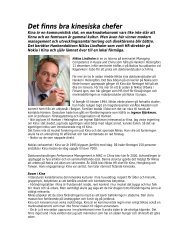CEFA / CIIA - Svenska handelshögskolan
CEFA / CIIA - Svenska handelshögskolan
CEFA / CIIA - Svenska handelshögskolan
- No tags were found...
You also want an ePaper? Increase the reach of your titles
YUMPU automatically turns print PDFs into web optimized ePapers that Google loves.
<strong>CEFA</strong> / <strong>CIIA</strong>Certified EFFAS Financial Analyst /Certified International Investment Analyst
EXCELLENCE THROUGH EDUCATIONThe international financial world around us is evolving atan increasing speed. Experts working within the financialsector are continuously confronted with the need toupdate their professional knowledge and skills. A professionalprogramme aimed at satisfying this need is thebest guarantee of keeping up with the demands of todayand, more importantly, of the future.A standardised education for financial analysts in Europe,the <strong>CEFA</strong> Programme, has now been accredited in over20 countries. The <strong>CEFA</strong> Programme in Finland has beenrecognised by the financial community and gained specialrecognition for its academic merit for 14 years sinceits inception. Today, <strong>CEFA</strong> Programme is an importantbackbone of the <strong>CIIA</strong> exam. <strong>CIIA</strong> (Certified InternationalInvestment Analyst) is a globally recognised designation,which since its inception in 2000 has established itself asa certificate with the highest quality status in all parts ofthe financial world. <strong>CIIA</strong> is accredited by A<strong>CIIA</strong> (Associationof Chartered International Investment Analysts) andits globally standardised final exams are today availablein 11 languages.The aim of the Finnish <strong>CEFA</strong>/<strong>CIIA</strong> Programme is to updatethe skills of the financial professional who is working asinvestment executive, financial analyst, portfolio manageror is in need of in-depth analytical skills in his/her dailywork. The <strong>CEFA</strong>/<strong>CIIA</strong> Programme integrates the funda-mentals of financial theory with the latest knowledge ofthe financial service industry practises and regulation andhelps its participants face the challenges of an increasinglyinternational marketplace. The <strong>CEFA</strong>/<strong>CIIA</strong> Programmeprovides a solid theoretical academic education and offersan effective method for broadening and updatingimportant professional skills and knowledge.The <strong>CIIA</strong> diploma today represents the trademark of highestquality among investment professionals. The <strong>CEFA</strong> diplomacontinues to be a guarantee of quality to the <strong>CEFA</strong>certificate holders. Indeed, a standardised professionaleducation has in many countries become a requirementthat a growing number of employers, clients and regulatorsdemand.The objectives of the <strong>CEFA</strong>/<strong>CIIA</strong> Programme are wellaligned with those of the Finnish Society of Financial Analysts.The goal of <strong>CEFA</strong>/<strong>CIIA</strong> Programme is to raise thelevel of professional expertise, to standardise the work ofinvestment professionals as well as to solidify internationallyaccepted rules of conduct. All these goals are veryimportant to the Finnish financial community.THE FINNISH SOCIETY OF FINANCIAL ANALYSTSMatti RiikonenChairman
Educational Programme for the<strong>CEFA</strong>/<strong>CIIA</strong> CertificatesThe <strong>CEFA</strong>/<strong>CIIA</strong> Programme offers in-depth informationon capital markets and international trends in the useof financial instruments. Modern financial theories andtheir applications in addition to the relevant legislationand the function of financial accounting data analysesare covered in the Programme.The <strong>CEFA</strong>/<strong>CIIA</strong> Programme is organized by the Center forFinancial Research (CEFIR) at the Swedish School of Economicsand Business Administration in cooperation withthe Finnish Society of Financial Analysts.The <strong>CEFA</strong>/<strong>CIIA</strong> Programme prepares the participant fortwo separate professional certificates, <strong>CEFA</strong> and <strong>CIIA</strong>.The programme of studies aiming at the <strong>CEFA</strong> diplomafollows the training and qualification standards set bythe European Federation of Financial Analysts Societies(EFFAS). Upon completion of the course and two yearsof practical experience working in the domain of financialanalysis, portfolio management and/or investment ingeneral, participants in the Programme are awarded aEuropean diploma, the <strong>CEFA</strong> Certificate.The <strong>CEFA</strong> part of the programme is also a prerequisite fortaking part in the global <strong>CIIA</strong> exams. The programme ofstudies aiming at the <strong>CIIA</strong> diploma follows the qualificationstandards set by the Association of Chartered InternationalInvestment Analysts (A<strong>CIIA</strong>). The <strong>CIIA</strong> consists ofnational level exams (which in Finland are covered by theHanken <strong>CEFA</strong> module exams) and two final internationalexams, <strong>CIIA</strong> exams 1 and 2. After successful completionof the final level <strong>CIIA</strong> exams and three years of practicalexperience working in the domain of financial analysis,portfolio management and/or investment in general, participantsin the Programme are awarded the Internationaldiploma, the <strong>CIIA</strong> Certificate, the international token of ahighly qualified analyst.Target GroupThe primary target group for the course consists of professionalfinancial analysts within the field of financialanalysis, portfolio management and corporate finance.A prerequisite for the granting of the <strong>CEFA</strong> Certificate isan appropriate academic degree. The programme is targetedfor 25-30 participants annually.Course StructureThe course is structured around seven units consisting ofa series of lectures, exercises and case analyses for a totalof 260 hours that begin in September and end in May.The exercise and case analyses are carried out in smallgroups with the support of the instructors and group colleagues.Each unit consists of a two-week period of instructionfollowed by approximately two weeks of individual studyand is completed through a written examination. Fortyevening classes are held at Hanken in Helsinki. Four twodayseminars are held during office hours on Fridays andSaturdays in stimulating and comfortable out-of-townsurroundings.<strong>CIIA</strong> prep courses before the <strong>CIIA</strong> exams.The main language of instruction is Finnish. English is extensivelyused in the course literature, and may be usedin some additional material.<strong>CIIA</strong><strong>CEFA</strong>(in-class tution,7 module exams)<strong>CIIA</strong> global finalexams 1 and 23 years ofworkingexperience** <strong>CEFA</strong> exams + 2 years of working experience already entitles tothe <strong>CEFA</strong>-diploma.
Course Units1. Financial Markets: Structure,Operation and RegulationA comprehensive overview of the function, developmentand prevailing rules governing the general structure andoperation of financial markets and trading systems, includinga discussion of the supervision of financial marketsand their regulatory agencies, and an analysis ofthe key rules and legislation governing the influence ofmarket participants on market efficiency, volatility andliquidity.2. Financial Accounting and FinancialStatement AnalysisAn examination of the accounting data used in financialanalyses, of the accounting and economic concepts ofprofit and value, of the problems in valuating assets andliabilities, and of the major ideas in balance sheet andincome statement analysis.3. Equity Valuation and AnalysisCorporate value creation and equity valuation. Equityanalysis using relative valuation multiples and discountedcash flow models. Key concepts include free cash flow,payout and plowback ratio, sustainable growth rate, costof capital, financial leverage, economic value added.4. Corporate FinanceValue implications of long-term corporate financial decisionssuch as dividend policy and capital structure. Raisingcapital. Use of non-standard sources of financing such asmezzanine financing. Fundamentals of short term financing.Mergers and acquisitions, LBOs as well as corporategovernance.5. Fixed Income Valuation and Analysis,and EconomicsAn examination of the types, characteristics and pricingof fixed income securities. Topics covered include theeffects of differences in maturity and credit risks, fundamentaldeterminants of interest rates and the termstructure of interest rates, the estimation of the durationand convexity of interest rates, and hedging. Course participants,upon successful completion of this unit, will beable to value both standard and special bonds such asbonds with warrants, convertible bonds, callable bondsand mortgage backed securities. This module also includesan economics part, focusing mainly on macroeconomics.The topics include basic macroeconomics, andmacroeconomic dynamics such as economic growth andbusiness cycles. Also open-economy issues including exchangerate determination and monetary policy will bedealt with.
6. Derivative Valuation and AnalysisAn in-depth examination of the market for derivative instrumentsfocusing on financial forwards, futures, anddifferent types of options and swaps. Topics covered includeoption pricing applications as well as the use ofderivative instruments in portfolio management.7. Portfolio ManagementAn introduction to the key concepts and main resultsof modern portfolio theory, including current empiricalstudies of asset pricing and international diversification.Issues discussed include the combination of assets intoportfolios, the meaning of risk, the elimination of risk,the determination rate of return requirements for riskyassets, performance evaluation of portfolio managers,and passive and active strategies for portfolio management.
InstructorsMost of the <strong>CEFA</strong>/<strong>CIIA</strong> Course Instructors are membersof the staff of the Swedish School of Economics and BusinessAdministration in Helsinki. The Course also includescontributions by outside experts from the financial sector.Professor Eva LiljeblomDepartment of Finance, Swedish School of Economicsand Business Administration, Helsinki<strong>CEFA</strong>/<strong>CIIA</strong> Course DirectorProfessor Anders LöflundDepartment of Finance, Swedish School of Economicsand Business Administration, HelsinkiMember of the Board of Directors of the <strong>CEFA</strong>/<strong>CIIA</strong>CourseProfessor Timo KorkeamäkiDepartment of Finance, Swedish School of Economicsand Business Administration, HelsinkiMember of the Board of Directors of the <strong>CEFA</strong>/<strong>CIIA</strong>Course
TimeThe course, beginning in September andending in May, consists of evening lectures,exercises and case analyses. In addition, fourweekend seminars are included.LocationHanken, Arkadiankatu 22, 00101 Helsinki.Seminars are conducted at some of the nearcongress centres outside Helsinki.ApplicationTo apply to the programme a special applicationform must be filled out, which can be requestedfrom the course assistant. In additiona resume including academic history shouldbe enclosed.AdmissionApplicants are informed of admission inJune.Further informationFor more information, please contact thecourse assistant at +358-9-431 33 537
Oy Nordinfo Ab / Ekenäs Tryckeri 2008HANKEN<strong>Svenska</strong> handelshögskolanCENTER FOR FINANCIAL RESEARCH(CEFIR)PL 47900101 HELSINKI



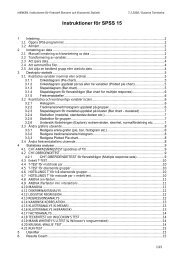
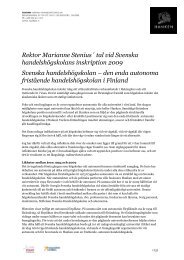
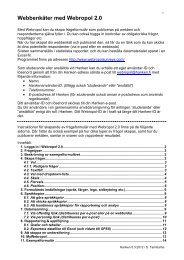
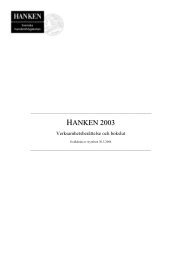
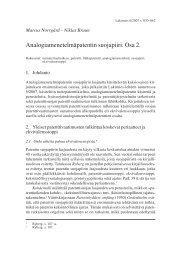
![Jämställdhetsplan 2012-2014 med bilaga [pdf]](https://img.yumpu.com/48770085/1/190x245/jamstalldhetsplan-2012-2014-med-bilaga-pdf.jpg?quality=85)
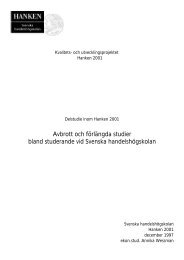
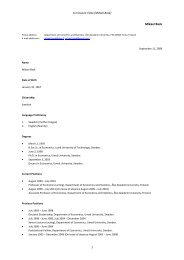
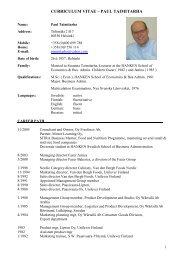
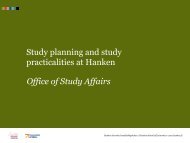
![Information for International Exchange Students [pdf] 9213k](https://img.yumpu.com/42377801/1/184x260/information-for-international-exchange-students-pdf-9213k.jpg?quality=85)
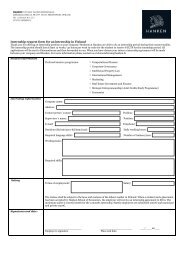
![och ekonomiplan 2007-2010 [pdf] - Hanken Svenska ...](https://img.yumpu.com/40271871/1/184x260/och-ekonomiplan-2007-2010-pdf-hanken-svenska-.jpg?quality=85)
